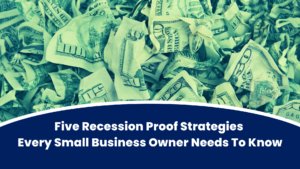Leveling up your leadership starts when you set your strategy and stop working in your business and start working on it.
By Jenny DuFresne
In this three-part series, I’m going to help you think about some crucial things you need to do to build an amazing company or organization. At my business growth training firm, Leaders Transform, my goal is to help leaders really understand what happens when they are growing their companies and give them the tools they need to succeed. In this space, I’ll talk about three levers all leaders need to up-level their leadership: strategy, accountability, and clarity. Today, we’ll focus on accountability.
As you’re looking to scale your company, or as you’re taking on more ownership and more roles and responsibilities inside of the company, after strategy, the next area that is really important for leaders to focus on is accountability.
Now, there’s a whole lot of conversation about accountability. It’s kind of a T-shirt slogan, now. But what we don’t think about enough is what it means for leaders. As a leader, you need to consider the conditions around accountability. What’s the environment? What’s the culture that I need to create that creates a culture of accountability?
With my military background, I’m a firm believer that we always lead by example, and that everybody’s always watching. So, that means taking responsibility for doing what you say you’re going to do. That’s not just at the leader level, but also for every single person in your company. It’s about getting things done. It’s that pressure to get things accomplished. That’s how you can also get your ROI faster and grow the company.
I’m working with a multimillion-dollar company right now, trying to help them scale their business. It’s fascinating. There are no deadlines. There are no expectations for when things are to be delivered. And what I’ve noticed is it’s really hampering the company’s growth progress. I need to help them take ownership. Accountability will inspire confidence. Accountability will build trust. Accountability will create reliability. You need all of that to scale a business.
There was a workplace accountability study done a few years ago where 40,000 people participated. And here’s what they discovered: 85% of the 40,000 said they did not have clarity on what their results needed to look like. Eighty-five percent did not know what results they were striving toward! Translate that to your own organization. You have big goals. You set your strategy. You have priorities. You’ve identified the resources you need. You’ve done all this work. But if you’re not doing a good job of helping people understand what the results should be, what are you accountable for? What is your role? What are you delivering on?
That 85% statistic about the accountability gap was shocking to me. Another one that blew my mind: 93% of that 40,000 were unable to align their work and take accountability for the results. There is substantial research that says, “When people don’t understand what their goals are, they have a huge workplace conflict.” It is actually one of the biggest contributors to workplace conflict when people don’t understand what it is that they’re supposed to do. That creates either a duplication of effort or apathy. So, accountability is very powerful. It’s really important for leaders to understand, “Hey, we have goals, but does every single person in my organization understand what his or her goal is and how that contributes to the overall execution of what we’re trying to accomplish.”
Another part of this is that there is a very significant number of folks who said that the leader’s behavior was the most central factor to influencing workplace cultures. If leaders aren’t doing the work to not only chart the future, but also to talk about, train, and ensure that others are trained around them, then what does it mean to be accountable? What does it mean to get results? No matter how large or small your company is, this is a crucial area to hone in and focus on.
How to create a more accountable culture
And so you might be asking, how do I do it? How do I create a more accountable culture? Well, one thing that’s really important is that an accountable team or accountable culture does not happen overnight. You can’t come by and go, “Okay, everybody, all right. Today, we’re going to start being accountable. I expect everyone to be accountable.” And then you exit stage left and then that’s it. It doesn’t work that way. Accountability, like great communication, is something you have to work on consistently.
Purposeful meetings
So, there’s a couple of things you can do. First of all, when you have meetings, make sure that they’re purposeful, make sure that they are focused on outcomes. If there’s not an outcome or decision, you don’t need to have a meeting. You can go do it in email or some other mechanism.
But make sure that you have regular meetings. I know that when I was scaling our organization and we were adding so many team members my regular meetings fell by the wayside. That’s not unusual. It’s reality. Every CEO that we work with at Leaders Transform has this problem of staying consistent. So, have a regular, focused meeting no matter what, and identify what your goals are. Have people report their accomplishments relative to their goals. Make sure that those meetings are really results focused and not just one of those meetings you have because you should meet.
Proactive, positive culture
Second, you need to have a proactive and positive culture. So, what does that mean when we’re talking about accountability and an accountable team? Let’s first drill down on what culture is. Culture is about behaviors. It’s about creating an environment that drives positive behaviors.
So, if you have core values, for example, you want those to be identified and to have clear behaviors attached to them. If you have a value of integrity, for example, you have to make sure that there’s a clear set of behaviors that align with that word “integrity” and whatever your definition of it is. So often we have the values but we don’t really pay attention to what the behaviors are, so people make them up. When people make things up, it actually creates a negative culture. And culture is so important. It’s part and parcel to retaining people. It’s what your customers talk about when they have an interaction with you.
When people are clear about their goals, when they’re clear about the strategy, when they’re clear about why they’re doing what they do, you have increased engagement and increased productivity. All that comes from leadership. It starts at the top. Always. It starts at the top and then needs to permeate to every other formal or informal leader inside of the company. That’s absolutely critical.
One of our clients was a really large government agency and they did not have a vision statement, a mission statement, or any core values. So, we spent about six to eight months helping them start to formulate what those things look like. And as we did that, we talked about making sure that your values have clear behaviors attached to them. So, they picked values like professionalism, and we had to really drill into what that really means. We now are working with the leader and leadership team to make sure that they’re communicating those core values every single day, no matter what. They’re acknowledging the behaviors that are aligned with core values and they themselves are living those core values, which is also really important.
Celebrate successes
And then finally, the last piece around accountability is celebrating the team’s achievements. With the pandemic, if you are a company where everyone’s been remote, it’s even more difficult sometimes to remember to celebrate the wins that people are getting. But I want to strongly encourage every leader to double down on it. Even if you just spend five minutes every day, jot down your wins that your team has gotten. Require all your leaders and managers to do this. Then take every opportunity to celebrate those wins. And it can be verbal. If you’re on Zoom, it could be a little certificate that pops up. Whatever it is, take time to really celebrate team achievements because those really help solidify people’s connection.
Accountability is just one of three pillars you need to up-level your leadership. You also need strategy (part 1) and clarity. Next time, I’ll talk about clarity.
Jenny DuFresne is the chief executive officer of Leaders Transform, a business growth training firm that has served over 3,500 leaders and teams across the U.S. and internationally. Learn more at LeadersTransform.com.




